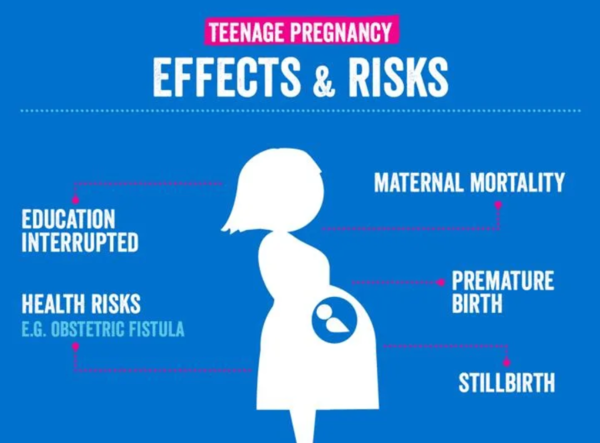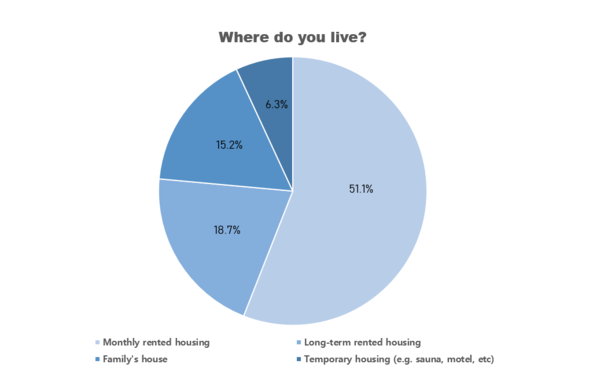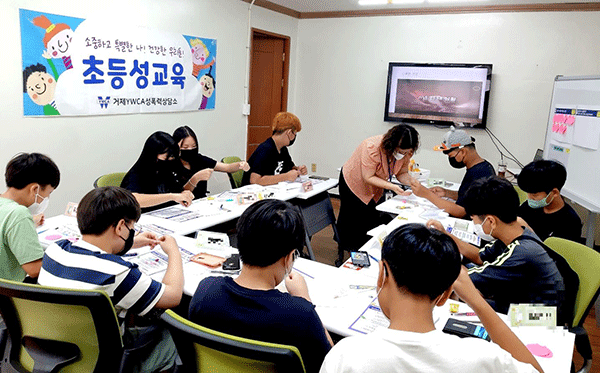
These days, 'Teenage Parents,' an entertainment program related to teenage pregnancy, is sparking debate. This program tells the story of teenage parents, moving viewers by showing how teenagers raise their children. On the other hand, there are voices of concern that are worried about the difficulties the parents face while caring for their children. Also, it is realized that teenage pregnancy can be a social problem.

A serious problem, but not in the media
Recently, as the issue of teenage pregnancy has emerged socially, the perception that teenage pregnancy is on the rise is widespread. However, according to teenage mothers' birth status from the National Statistical Office, 2,227 babies were born in 2015, 1,526 in 2017, and 1,106 in 2019 to teenagers. The statistics represent a decline in the number of newborns born to teenagers, which is different from the social perception. Although teenage childbirth is decreasing, one of the main reasons why teenage pregnancy has become a social problem is the lack of awareness of the importance of contraception. In a report from the Ministry of Health and Welfare, as of 2020, 2,528 of 54,948 (4.6%) teenagers had experienced sexual intercourse, and only 33.2% of them had used contraception.1) This means that more than 6 out of 10 teenagers with sexual experience did not use contraception, and shows that some adolescents tend to neglect the importance of contraception. In addition, there is the risk that the more teenagers have sex without contraception, the more the cases of teenage pregnancy will increase. In this situation, it is argued that fundamental solutions to the problem of the absence of contraception should be devised.
The number of teenage mothers is decreasing compared to before, but the issue of teenage pregnancy has been brought up through various media content. The drama "Our Blues," which aired in April 2022, deals with the pregnancy and childbirth of high school students. This drama reflected the practical difficulties experienced by teenage mothers, but also showed them happily giving birth. These risks encourage teenagers to fantasize about teenage pregnancy. Also, "Teenage Parents," a program that shows the lives of people who had children and become parents in their teens, has appeared. This program seems meaningful in that it reveals the problems of teenage pregnancy and shows the difficulties of childbirth and parenting experienced by teenage parents. However, the program includes three entertainers, counselors, and lawyers, and does not provide professional counseling to solve the difficulties of teenage parents. Regarding this panel organization of the program, critic Jung Deokhyun said, "The subjects that are valued in terms of diversity will be highly inclined to become inflammatory developments."2) To be specific, he emphasized that such media content not only deals with teenage pregnancy as a provocative subject but also focuses on only fun. This is expected to make it difficult for people to recognize teenage pregnancy as a problem.

Why it should be taken seriously
Teenage pregnancy is a problem that worsens the health of young mothers. The World Health Organization said that teenage pregnancy is likely to cause complications such as toxemia, postpartum endometritis, anemia, intrauterine death, and systemic infection. Also, newborn babies born to young mothers could have problems such as low weight and premature birth. In other words, teenage pregnancy and childbirth are dangerous not only to the teenage mother but also to the health and life of the fetus. The National Statistical Office announced in 2020 that the neonatal death rate of mothers under 20 years old was 7.6, followed by those between 20 to 24 years old. For this reason, pregnancies to women under the age of 19 are classified as high-risk. Kim Sulim, a professor in the Department of Obstetrics and Gynecology at the International St. Mary's Hospital, said, "Teenage mothers are in a blind spot for health care, so they often have worse nutrition than adult mothers, which can lead to dystocia, post-birth bleeding, and maternal death."3) This means that teenage mothers are vulnerable to various complications because they are in an environment where it is difficult to recover after giving birth. In such cases, there is a high risk that the resilience of the mother will decrease and cause aftereffects. This is called postpartum stroke, and typical symptoms include joint pain, sensory impairment, depression, obesity, and so on. In addition, the ligaments of the whole body are stretched during pregnancy, and the spine and pelvis are strained to withstand the weight of the fetus. However, since most teenage mothers are in an environment where it is difficult to take care of their health, it seems that they are likely to suffer from mental and physical aftereffects. Therefore, beyond the harm to the health of the mother and child, the teenage mother will suffer from complications, if she doesn't get sufficient healthcare after childbirth.
Teenage pregnancy not only adversely affects the teenage mother physically and mentally, but also teenage parents, still students, who have the right to learn in school. The 'Teenage Parents Survey and Research Report' released by The Beautiful Foundation and the Korean Unwed Mothers Support Network in 2020 showed that 101 out of 315 teenage parents (31.9%) under the age of 24 who have given birth and are currently raising children dropped out of high school and more than 40% dropped out of college. It is shown that teenage pregnancy and childbirth can cause a suspension in adolescents' study. Studying is considered necessary for adolescents to acquire the qualities or abilities they need in life and provide opportunities for growth. However, if they stop studying, it is expected that they will have difficulties in finding a job and receiving such education that will develop their careers. The Ministry of Education's statistics on population distribution by educational background showed that the employment rate of the population who completed further education in 2020 was 77%, 70% for high schools, and 61% for middle schools or lower. Therefore, it seems that teenage parents who are in a situation where they have to give up learning by experiencing pregnancy and childbirth in adolescence will have difficulty finding employment. In this regard, she said in an interview with a single teenage mother who is struggling financially, "I want to go back to school when my child grows up to some extent."4) Through this, the suspension of studies appears to be problematic in that it leads to the problem of living economically unstable lives.
These problems make it difficult for them to live economically stable lives. The 'Teenage Parents Survey and Research Report' released in 2020 showed 147 out of 315 teenage parents (53%) respondents' average monthly income was less than 1 million won, including salary, governmental support, and family support. It seems that more than half of them face financial difficulties, which shows that most are in an environment where it is difficult to maintain a stable living. Such precarious living conditions also affect the housing situation of teenage parents and their children. According to this report, 51.1% of teenage parents live in monthly rented housing, 18.7% live in long-term rentals, 15.2% live in their family's house, and 6.3% live in temporary housing such as a sauna or motel. This means that more than half of them live in some form of rental housing, which is a considerable financial burden. In addition, only about 15% of them live in their own family's house. Regarding this, Eun Joohee, a senior researcher at the Korean Unwed Mothers Support Network, explained, "This means that teenage parents have not received sufficient protection and support from parents."5) It is found that most teenage parents will suffer from not only lack of financial support but also a lack of mental support and care.

Where Teenage Parents Live

Lightening up their burden
To solve the problems that teenage parents face, the government is arranging ways to help them financially. The Ministry of Gender Equality and Family is implementing a project to support teenage parents and their children by supporting their parenting and independence. The system provides 200,000 won per month to relieve the burden on youth caregivers who study and raise children at the same time. This system covers not only child-rearing expenses, child education expenses, and living subsidies, but also parents' learning subsidies. However, it is argued that there is a problem with the recipients of this system: 'households with a median income of 60% or less of the standard median income.' The median income of 60% is about 2 million won, and according to this, it is pointed out that teenage parents who must earn money to raise their children and live their life may not be able to receive support. In other words, those who stop studying and engage in economic activities to make a living are not supported, while youth caregivers who do not have to do without the help of their parents can receive subsidies. In response to these criticisms, an official at the Ministry of Gender Equality and Family said, "There may be systematic loopholes because the exact status of teenage parent households is not yet known."6) The government wants to identify and supplement the problems revealed in the pilot project before fully implementing the project. Also, it is shown that they will supplement the related policies for youth parents to prepare them for study, employment, and economic activities.
Financial support can improve their material lives, but counseling can protect the mental health of teenage parents. If counseling is conducted well, it can have a positive effect, but in some cases, they are reluctant to receive face-to-face consultation due to the social perception of teenage parents. The Ministry of Gender Equality and Family, the Korea Youth Counseling and Welfare Institute, and the social enterprise BtoB support pregnancy to increase self-reliance in crisis families and provide mothers with the resources necessary to raise children. Puum, a program provided by BtoB, which plays a role in linking the government and the private sector, provides information to them and also conducts counseling for teenage mothers. The program, which allows participants to choose either face-to-face, phone, or Internet counseling, also provides counseling and psychological tests using the Youth Cyber Counseling Center 1388 website. One woman who gave birth in her first year of high school said, "My parents told me to abort the pregnancy or leave, and now I've lost touch with them. Eventually, I gave birth to a child at a single mother's facility."7) This is an example of a teenage woman losing connections with her family when she is pregnant, and left with no place to rely on. Some teenage women who are pregnant have no place to live comfortably and prepare for childbirth. The counseling program provides teenage pregnant women like her with the opportunity to share information related to pregnancy, childbirth, and childcare and share their concerns.
As such, support activities related to youth parents are being carried out, but the most important part of this problem is the prevention of teenage pregnancy. Some think that sex education provided to teenagers is problematic and stops at only theory. Sex education experts also point out that education in Korea is not true sex education. Kim Minyoung and Lee Seokwon, co-chairmen of the private sex education institution Jaju School, said, "School sex education is not efficient to develop values for sex or to develop discernment and judgment, but only education to prevent sexual violence. There are many shortcomings in terms of education time and diversity."8) They criticized that the current sex education in schools does not teach in detail about sex including methods of contraception, so there are few actual effects of sex education. It also means that teenagers should be educated properly on contraception methods. In response to the criticisms, local governments are making efforts to provide sex education that is more helpful to teenagers. The Geoje YMCA Sexual Violence Relief Center is providing customized sex education for each elementary school student. This education is conducted according to the demand of the subjects based on the data accumulated through continuous education. Therefore, more practical sex education is provided, not the formal one that existed before. Also, there is a need for state and social organizations to make continuous efforts to realize the problems that exist in sex education in our society today and improve them.

Sex education for elementary school students
To stop teenagers from becoming 'youth parents'
As teenage pregnancy is being discussed more, there are various opinions on it. However, since teenage pregnancy adversely affects the health of adolescents and fetuses, it seems necessary to recognize it as a problem. Also, most teenage parents suffer from suspension of studies and financial difficulties. It is expected that teenage pregnancy can cause confusion to individuals and society. In order to solve these difficulties, the government and social institutions are striving to provide mental support as well as financial support for them. But, since teenage pregnancy has various problems, it is important for students to receive proper sex education such as appropriate contraceptive methods to have the right perception of adolescents' sex or pregnancy.
1) Cho Sunkyo, "Integrated Support Such as Raising Teenage Parents, Education, Housing, and Emotions Is Required", Chungcheongtoday, August 28, 2022
2) Jung Minkyung, "A Broadcast that Reveals Diversity, Is It 'Visualization of Minorities' or 'Consumption of Minorities"", Media Today, July 10, 2022
3) Lee Hena, "'Teenage Parents' Is on the Hot Issue… Teenage Pregnancy Become Toxic to the Body", The Chosun Media, April 24, 2022
4) Kim Namhee, "'A High School Mom' Who Is Sad To Give Birth…"I Was Refused To Be Hospitalized Because I Don't Have a Guardian"", Newsis, July 13, 2022
5) Lee Hyunjung, "Pregnant Teenagers, Extreme Hardships of Life Due to the Application of the Obligation to Support", The Seoul Shinmun, August 9, 2021
6) Choi Sangwon, "Support for Teenage Parents, if You Work Hard, You Can't Get It?", The Hankyoreh, July 17, 2022
7) Ham Minjung, ""I'm Pregnant." Kicked Out of Being Pregnant and Went to the Motel..."Teenage Parents" Survival Story. [Secret Room]", JoonangIlbo, August 18, 2022
8) Yoon Sangeon, Park Gun, Choi Yeonsu, ""Have to Teach Masturbation and Contraception" vs. "No Focus Only on the Body"...the Answer to K-Sex Education Is", JoongangIlbo, November 8, 2020
Kang Kim Hyojung / Reporter
smt_kkhj@sookmyung.ac.kr
Lee Han Jiwon / Reporter
smt_hjw@sookmyung.ac.kr


